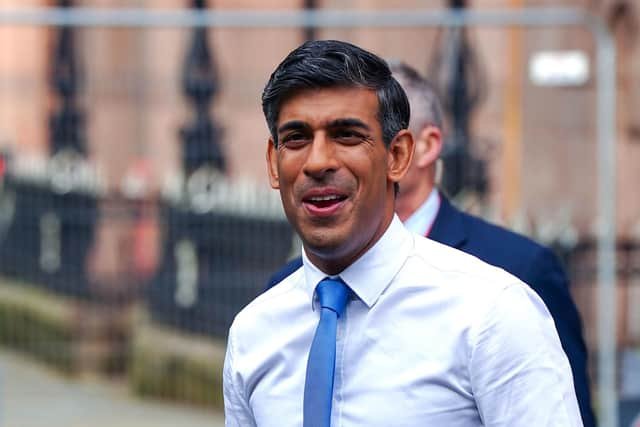Conservative conference: Rishi Sunak must show conservative credentials to carry his party conference – Brian Monteith
There is nothing like staring over the precipice of certain electoral defeat and considering the resulting oblivion to concentrate a politician’s mind. Since becoming prime minister without a general election Rishi Sunak has endured his own long march to become accepted. He has been behind in the polls to Keir Starmer’s Labour Party by at least twenty points for much of his premiership and according to YouGov fell below the lowest popularity rating of Boris Johnson in early September.
Rather than be a lifeboat for nervous Conservative MPs fearful of losing their seats, Sunak showed signs of taking them down to Davy Jones’ locker with him.
Advertisement
Hide AdAdvertisement
Hide AdRegular readers of this column will know that I am not a Sunak cheerleader. He has contributed to many of the challenges the country faces by making some appalling political decisions, first as Chancellor and then as Prime Minister, that contributed to out of control public spending, high inflation and even higher taxes.
His Windsor Framework is an archetype of Sunak policy spin; claimed as being the solution to the many problems of the Northern Ireland Protocol, it is in fact a fraud upon the British public, as will become increasingly clear following the new customs procedures commencing yesterday.
With such distance between Sunak’s policy presentation and the reality of lived experience, questions will continue to be asked if what he says can be trusted and what he really stands for.
Indeed, over the course of almost a year Rishi Sunak has appeared the least conservative of Conservative prime ministers I have known, even including Edward Heath, who inherited and operated under a public sector consensus at a time of trade union dominance. To his great advantage Sunak inherited an altogether different economic consensus favouring smaller government, lower taxes and a pro-Brexit national sovereignty – and yet has managed to subvert all those to the point of appearing more Blairite than Gordon Brown.
It is no wonder then that many Conservative party activists consider him an imposition made possible by weak and self-interested MPs, many of whom have now chosen not to stand and fight for their seats.


Yet all the foregoing criticism could be of no consequence if, chameleon-like, Rishi Sunak decides to now find his conservative credentials – and there is no better place to start than at his party conference.
Announcements that question the received wisdom of his own Government’s rush to impose Net Zero policies on a previously unsuspecting public suggest Sunak is willing to become his own man by challenging the rate of change, if not the change itself.
The relaxation of the timeline for banning petrol-fuelled motor cars and gas-fuelled boilers came as a shock in Westminster, but has shown he is willing to listen to public fears about the pace and cost of change. Like so many policies passed down from technocratic officials and lobbied for by vested interests, but which do not chime with the public mood, there had been next-to-no-debate in advance of them being adopted.
Advertisement
Hide AdAdvertisement
Hide AdThe review of the HS2 Birmingham to Manchester extension, is another example of a grand folly thought worthy by politicians spending other peoples’ money, practically few of whom would still be in office by the time it was expected to materialise. The original cost of £17.5bn is now likely to reach £45bn and what has already been spent could have more usefully been used to improve the rail network’s infrastructure, bringing more benefit to a greater number of people. That Sunak is willing to question such shibboleth’s defended by the likes of Michael Heseltine will win him many admirers in his party.
Downing Street’s defence of Suella Braverman’s recent speech on immigration and multiculturalism – which means Sunak’s endorsement of her interventions – are not about big policy changes that will deliver a noticeable difference, but instead aim to call out Labour for offering no policy alternatives. This has to be seen in the context of polling showing 51% public support for using Rwanda to process refugee applications of trafficked migrants and 66% agreeing with Braverman that uncontrolled and illegal migration is an "existential challenge to West".
While Rishi Sunak has irritated many Brexiteers by being unwilling to countenance the UK diverging from EU laws, he now wants to diverge from consensual Red Tory-Blue Labour policies that have allowed voters – including many former Conservative supporters – to believe Kier Starmer could not be any worse. This forces Labour to ask itself if it will back Sunak’s positions on Net Zero, tackling wasteful spending and tightening laws determining who controls our borders – our own parliament or foreign-based courts.
On the economy there should be little doubt public expectations are now being managed so we are conditioned by a period of fiscal sobriety presented as sombre prudence and competence – that sets up some tax cuts in advance of the next general election. Again, the idea is to ask questions of Labour, so the public has to face a real choice of substance that makes sticking with Sunak more palatable than speculating with Starmer.
The latest polling now puts Labour’s current lead at 15% - down 3 points in the last week.
If Sunak can encapsulate these types of differences in a single speech to conference the polling gap could yet be recovered in good time for a late summer General Election. At that point it would be anyone’s race – and the last thing on Scottish voters’ minds will be if they are taking part in a de facto independence referendum.
Comments
Want to join the conversation? Please or to comment on this article.